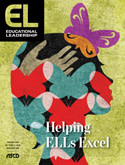SUMMER 2016
DIGITAL ONLY WITH SPECIAL LARGER DISTRIBUTION
Educators as Change Agents
Educators are often the experts in knowing what students need—and they are increasingly assuming prominent roles in making schools better. This issue will consider how educators are spurring improvement by advocating policy change, mentoring peers, conceiving of and implementing innovative projects, and pushing for shifts in the status quo. How can classroom teachers, principals, and other administrators work together for change? How can educators gain a voice at the tables where big decisions about curriculum, testing, and the profession are made? What are the roles of PLCs and online communities of teachers in fostering change? And what does it look like when classroom teachers go beyond "random acts of great teaching" and lead by modeling hope, caring, and grit in tough times?
Deadline: March 1, 2016
SEPTEMBER 2016
Relationships First
"Students won't care what you know until they know that you care." Research shows that stable, warm, and trusting student-teacher relations are a prerequisite for learning. This issue will look at how teachers can nurture relationships—even with oppositional students, struggling students, and those who prefer to hide. What are fresh strategies for getting to know kids and their passions as well as their cultures and families? How can we handle tough discipline issues while preserving students' trust? Affirm the strengths of strugglers even as we push them to stretch to reach standards? Give more than lip service to improving social and communication skills—so that students and teachers alike can cultivate a caring classroom community?
Deadline: April 1, 2016
OCTOBER 2016
Powerful Lesson Planning
"Creative teachers take joy in planning a variety of lessons," Nel Noddings has said. But in the quest to teach so much content and skills, planning isn't always creative or joyful. This issue will share promising approaches that strike a balance between planning required content and allowing lessons to follow students' questions and enthusiasms. Articles will take on big questions like how to ensure time for addressing standards, differentiation, and higher-order thinking, and how to try innovative planning approaches like flipped classrooms and interdisciplinary projects. We also welcome articles on the nitty gritty: how to begin and end a lesson, ways to use scripts effectively, how to set learning targets—and how to know when to ditch even your best-laid plans.
Deadline: May 2, 2016
NOVEMBER 2016
Disrupting Inequity
Despite decades of effort, public education still struggles with inequity. This issue will explore how educators can address the barriers that create opportunity gaps for students on the basis of their socioeconomic level, race, ethnicity, and gender. Articles will examine areas where equity is a challenge, such as financial resources, teacher quality, technology instruction, and access to a challenging curriculum. How can we confront the forces that keep economic and racial segregation in place? How can schools ensure fair, unbiased, and effective discipline practices? How can they bring traditionally marginalized families and students into the conversation? How can they create socially integrated climates within schools? How are schools and individual educators challenging inequity and rethinking assumptions about poverty, race, and gender?
Deadline: June 1, 2016
DECEMBER 2016/JANUARY 2017
The Global-Ready Graduate
What does it mean to live and work across many cultures, many time zones, and many technologies? Our students are certain to find out! This issue will explore how we can help students develop the global competencies they will need for active, responsible citizenship in an increasingly interconnected world. What helps students understand multiple perspectives on history and world events? How are they learning to collaborate and communicate? Tell us about your innovative language instruction programs, STEM classes, and arts curriculums that further career success, inform civic engagement, and promote flexible thinking, creativity, and problem solving. How are schools educating students about global problems? Are we teaching students how to cope with continuous and rapid change? Are we teaching them to be ethical citizens?
Deadline: July 1, 2016
FEBRUARY 2017
Disciplinary Literacy
John Locke said that reading furnishes only the materials of knowledge: "It is thinking that makes what we read ours." No matter what the discipline, students need to be able to think and write about the material they read so it becomes their own. Across the curriculum, teachers are looking for better ways to develop these reading, writing, and thinking skills. Articles in this issue will describe strategies teachers use to support students who struggle with reading, to find relevant academic texts, and to incorporate writing activities to enhance learning. How can we teach students to tackle complex texts and develop skills like locating textual evidence, evaluating arguments, and synthesizing information from print and digital sources? How does the application of these skills vary for different disciplines?
Deadline: September 1, 2016
MARCH 2017
Getting Personalization Right
"Have it your way" may be a catchy slogan, but how does it work in education? This issue will delve into the various ways educators define student-centered learning and what it looks like in schools. Articles will explore differentiation, project-based learning, "school of one," and customized learning using computers. To what extent is personalization possible in a standards-oriented education environment? How can technology best aid student-centered learning? Tell us how you've seen personalization done well—and not so well. We're interested in what the research says about the benefits of student-centered learning as well as stories of schools that have reimagined their instruction, schedules, and structures to give students more choice.
Deadline: October 3, 2016
APRIL 2017
Differences, Not Disabilities
All too often students are defined by their disability—a label affixed to their IEP, student records, and, over time, their identity. A growing movement seeks to shift the paradigm from "learning disabilities" to "learning differences." This small semantic change signals a shift in acknowledging that no two brains are the same, so no two students learn in the same fashion. We're interested in research into the science of various learning differences as well as articles on skills-based strategies that help students learn. Instead of labeling ADHD, autism, or dyslexia as deficits, how can we use all students' strengths to help them learn? How can approaches like Universal Design for Learning meet the unique needs of all? Tell us how you have embraced learning differences and the effect it has had on student achievement and school climate.
Deadline: November 1, 2016
MAY 2017
Lifting School Leaders
A great school depends on great leadership—from administrators and from teacher leaders. This issue will look at what it takes to develop and support outstanding leaders throughout a school. Articles will address such topics as the qualities and skills today's school leaders need; strengths and weaknesses of current leadership preparation programs; and how practices like internships, coaching, and teams can support new leaders. How can we reduce principal turnover? Help new principals hit the ground running? Evaluate school leaders in ways that support growth? How are teacher leaders taking on various roles, such as peer evaluator, coach, advocate, PLC facilitator, and curriculum developer? What kinds of job-embedded supports benefit leaders?
Deadline: December 1, 2016

